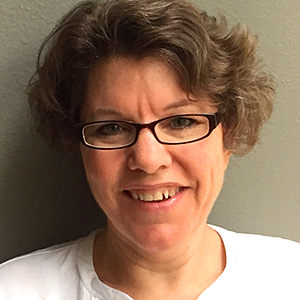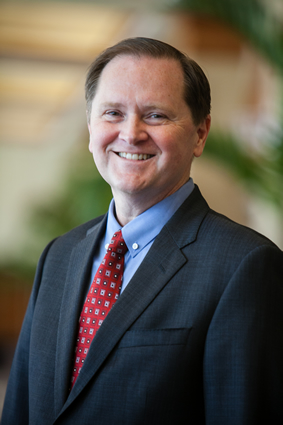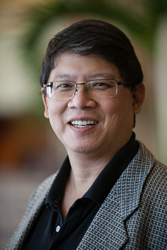
SUPER 2018 Mid-Atlantic + South Joint Regional Conference |
** = Emerging Leaders Session |

Javier Miyares is president of University of Maryland University College, the nation's largest public online university and a constituent institution of the University System of Maryland. Since his appointment in 2012, he has expanded access and opportunities for adult learners through key initiatives and has been in the forefront of leveraging "big data" and analytics to fuel advances in learning science. The university—which offers courses online and in a hybrid format at more than 20 locations stateside and in more than 20 countries around the world—has also expanded its corporate and institutional alliances under his leadership.
Miyares has maintained a singular focus on quality, access, and affordability for Maryland's adult learners and members of the U.S. military around the world. The Maryland Completion Scholarship enables Maryland community college graduates to earn a bachelor's degree from UMUC for a total cost of $20,000—including their community college tuition. Through a partnership with Prince George's Community College and Prince George's County Public Schools, UMUC has also created the Prince George's 3D Scholarship pilot program that allows high-achieving students to earn college credit while still in high school and ultimately complete a bachelor's degree for $10,000 or less.
In fall 2015, the university made headlines when it replaced publisher textbooks with open educational resources in all undergraduate courses, a move that saves students millions of dollars each year. UMUC's Graduate School followed suit in fall 2016.
Miyares has also committed his support to the university's evolving learning model, which focuses on a personalized learning experience for students at scale, with greater emphasis on competence and confidence as students prepare to enter professional positions.
Miyares worked closely with and received the unanimous approval of the University System of Maryland Board of Regents in creating a new business model that serves to keep tuition low and allows for innovative approaches to fulfilling UMUC's public mission. UMUC Ventures, a nonprofit supporting organization, now serves as a holding company for commercial enterprises that will provide the university with additional revenue streams.
During Miyares' tenure, UMUC was named 2015 Educator of the Year by the World Affairs Council of Washington, D.C., and ranked No. 1 by Military Times among "Best Colleges: Online and Nontraditional Schools" for 2018. The university's competitive cybersecurity team, the Cyber Padawans, won the 2014 Global CyberLympics in Barcelona, Spain; the 2013 and 2014 Maryland Cyber Challenge; and the inaugural Cyber DiploHack competition, organized by the prestigious Center for Strategic and International Studies, in 2015.
Miyares has often cited higher education as his gateway to the American Dream. Born in Havana, Cuba, he was taken out of the country by his Jesuit teachers on July 4, 1961, at age 14, after his father was imprisoned by Fidel Castro during the Bay of Pigs invasion. Miyares later joined Operation Pedro Pan and eventually moved to Maryland, where he attended the University of Maryland, College Park, earning bachelor's and master's degrees in sociology. He completed all the requirements but the dissertation for a doctorate in educational measurement and statistics.
Miyares currently serves on the board of directors of the American Council on Education (ACE); as a commissioner with the Middle States Commission on Higher Education; on the board of directors of Achieving the Dream; and on the U.S. Department of Veterans Affairs Veterans Advisory Committee on Education.
Jason A. Tyszko is vice president of the Center for Education and Workforce at the U.S.Chamber of Commerce Foundation. Through events, publications, and policy initiatives, the Center for Education and Workforce—in partnership with Chamber members and business leadership seeks to cultivate and develop innovate thinking that spurs action to preserve America’s competitiveness and enhance the career readiness of youth and adult learners.
Tyszko’s prior experience focused on coordinating interagency education, workforce, and economic development initiatives. In 2009, he served as a policy adviser to Illinois Gov. Pat Quinn’s administration and as a member of the Executive Committee that directed more than $10 billion in investments to aid in the state’s recovery. While in the Office of the Governor, Tyszko chaired the interagency Job Training Working Group and developed Illinois Pathways, the signature public private STEM education strategy included in the state’s Race to the Top proposal.
In addition, Tyszko was deputy chief of staff and senior policy adviser to the Illinois Department of Commerce and Economic Opportunity. There he oversaw the design and launch of the STEM Learning Exchanges, an innovative network of statewide public-private partnerships tasked with coordinating planning and investing to support regional STEM education and workforce programs. He further provided lead staff and policy support to the Illinois Workforce Investment Board.
Tyszko also managed innovative technology projects. This included the build-out of integrated education and workforce statewide longitudinal data systems and the implementation of the Illinois Shared Learning Environment, a transformative learning management system that enables personalized learning through integrated data in a cloud environment.
Tyszko received his Master of Arts from the University of Chicago and his Bachelor of Arts from DePaul University. He is a certified teacher in the state of Illinois. Tyszko resides in Washington, D.C.
Engage in a highly interactive session with a panel of senior leaders on where our dynamic field is headed. Alternative credentials, shifting demographics, and new models are already shaping how institutions serve students. This group of panelists will provide their unique perspectives on organizational and market forces that are emerging, how they are responding at their institutions, and how UPCEA members will lead us into the near-term future (2025!).
Dr. Nelson Baker, dean of Professional Education at the Georgia Institute of Technology and associate professor in the university’s School of Civil and Environmental Engineering, leads a multifaceted operation at Georgia Tech Professional Education. The division is comprised of the Global Learning Center, Georgia Tech-Savannah, the Language Institute, and an extensive program of professional education courses in science, technology, engineering, and math, with online professional master’s degrees, as well as an array of distance learning courses, both credit and noncredit.
Baker particularly seeks to create and assess ways in which technology impacts the learning of engineering students. His award-winning work has generated projects such as multi-lingual web-based intelligent simulations for problem solving; intelligent tutors; student models; an online faculty assistant tool for creating course objectives; and a variety of technology-based assessments and virtual reality interfaces for education.In addition to his role as dean, Baker serves as the U.S. principal investigator for a FIPSE Atlantis programme grant (P116J090074), an international activity exploring quality management and benchmarking of continuing engineering education programs; and also as a co-principal investigator on a five-year NASA project, Electronic Professional Development Network (ePDN), which develops and delivers STEM content to high school teachers.
In February 2012, Baker was appointed by Chancellor Huckaby to serve on the University System of Georgia's (USG) Distance Education Task Force to create a framework to better coordinate and guide the future use of distance education for the 35 colleges and universities within the USG system. He currently serves as the President of the International Association for Continuing Engineering Education, and is past-chair of the Georgia Board of Regents Administrative Committee on Public Service and Continuing Education. Baker is a board member for the University Professional and Continuing Education Association, and is an active member of ASEE and ASCE.

Sandi Pershing has been with the University of Utah since 2000, and has served as Assistant Vice President for Engagement since 2011. Pershing also served as Assistant Dean, and as Dean of Continuing Education from 2004-2016. She has worked as an organizational consultant and trainer in the areas of teamwork, organizational change, strategic planning, leadership, learning transfer, time management, creativity, management, and conflict resolution. Pershing is also the co-author of Organization Theory and Governance for the 21st Century (2014) with Eric Austin, and she co-edited Classic Readings in Organizational Behavior(2008) with J. Steven Ott and Richard Simpson, and Classics in Public Administration (2003) with Jay Shafritz and Albert Hyde.

Ms. Shendy has worked in higher education serving adult students since 1988. In her current work, Joellen focuses on the strategic future of credentialing and 21st Century student records, supporting student learning via projects that empower students with metacognitive agency to articulate what they know and can do throughout their educational journey. UMUC developed a new competency based extended transcript while working on a new comprehensive student record model as part of the Lumina Grant through AACRAO and NASPA in 2016. Ms. Shendy is a board member of both the Higher Education Advisory Board of Credential Engine and the Competency Based Education Network (C-BEN) and a frequent speaker at higher education conferences including AACRAO, UPCEA, WCET, and Learning Impact Leadership Institute.
 Bob Hansen, CEO
Bob Hansen, CEODr. Robert J. Hansen was named Chief Executive Officer of the University Professional & Continuing Education Association in September 2010. Under Hansen’s leadership, UPCEA has grown by 125% in the past six years. He established a number of initiatives targeting the association’s unique role in online leadership and management under the umbrella of the National Council for Online Leadership: the Summit for Online Leadership and Administration, the Online Leadership Roundtable for chief online learning officers, and the UPCEA Hallmarks of Excellence in Online Leadership. He also established the UPCEA Hallmarks of Excellence in Professional and Continuing Education, advancing two frameworks to provide a set of standards that reflect the ambitions, potential, and importance of units that serve adult learners.
Hansen previously served as Associate Provost for University Outreach at the University of Southern Maine, a regional public university located in Portland, Maine. Prior to that position, he spent six years at Saint Xavier University of Chicago as Assistant to the President & Secretary of the Corporation, and then as founding Executive Director of Orland Park Campus & Off-Campus Programs. Hansen also previously served as Assistant to the Governor for Education in the administration of former Illinois governor, Jim Edgar. Hansen earned a B.S. in Psychology from the University of Illinois, an M.A. in English Language and Literature from the University of Michigan, and a Ph.D. in English from the University of Notre Dame.
This presentation by Jim Fong, Chief Research Officer for UPCEA, will focus on how higher education is being shaped by the growing audience of millennials which is quickly becoming the majority of decision-makers, influencers, managers, directors, and organizational leaders.
 Jim Fong, Founding Director
Jim Fong, Founding DirectorJim Fong is the founding director of UPCEA’s Center for Research and Strategy. In his role, Mr. Fong has analyzed demographic, occupational, technological and societal trends and data to help the higher education community better serve the adult and corporate learner. As the Center’s director, he works closely with dozens of colleges and universities annually in new program development initiatives, enrollment management and marketing process analyses and the review of online and continuing education portfolios.
Prior to joining UPCEA, Mr. Fong worked as a higher education strategic marketing and CRM consultant and researcher for two firms and prior to that was the Director of Marketing, Research and Planning for Penn State Outreach. At Penn State Outreach, he was responsible for strategic marketing, marketing management, research, creative and database teams. Mr. Fong played a major role in the early launch of Penn State’s World Campus by assessing new program needs and the development of marketing strategies and systems.
Jim holds an M.B.A., an M.S. in Applied Statistics and a B.S. in Mathematics, all from The University of Vermont. In 2004, UPCEA awarded him the Adelle Robertson Award as its Continuing Professional Educator for the year. That year, he also received the Mid-Atlantic Region’s Distinguished Service Award.
Sessions tagged “Emerging Leaders,” ** denotes that this content is designed to offer skill development in areas critical for leadership like strategic planning, innovation, and leading teams. These sessions are open to any conference attendee, and are especially salient for participants of the regional Emerging Leaders program.